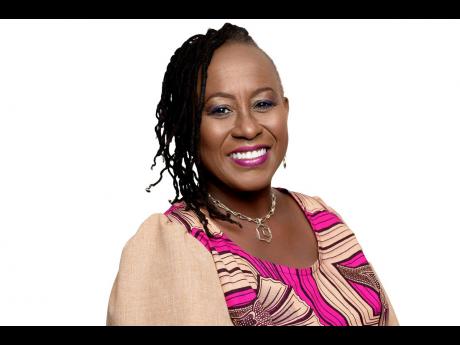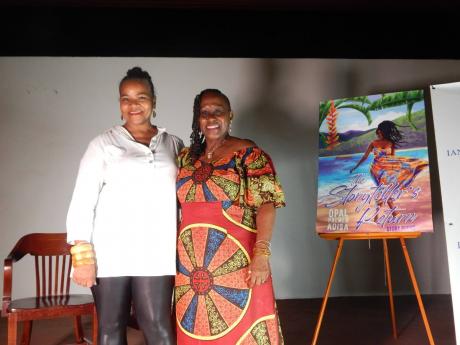Educators give high marks to Opal Palmer Adisa’s ‘The Storyteller’s Return’
Educators were plentiful at the launch of Opal Palmer Adisa’s latest book, The Storyteller’s Return: Story Poems. Hence, the abundant praise that flowed for the book might well have been thought of as “high marks,” especially by the author, herself an educator. (She also lists herself as a consultant gender specialist, cultural activist, author, speaker, and the former director of The Institute for Gender and Development Studies at The University of the West Indies).
But talk is relatively cheap, and though one would tend to believe the acclamations of eminent university professors like Dr Kwame Dawes (transmitted via video) and Dr Isis Semaj-Hall, the laudatory words of Christine Randle might have been even more significant. As managing director of the book’s publisher, Ian Randle Publications, she put her money where her mouth was and would have invested hundreds of thousands of dollars in the project.
Dawes spoke of the “honesty, clarity, humour, and daring” of the work and ended his online message by recommending it as “a fantastic book”. Semaj-Hall, the moderator/master of ceremonies of the event, said directly to the author: “Opal, you are an uncommon poet.”
Of her company, Randle confessed: “We always say, ‘We don’t publish poetry’, and for the most part, we don’t. But every now and again, an author will pull us out of our comfort zone and … well, that’s where the magic happens. This evening, we’re here to celebrate the magic that is Opal Palmer’s work.”
The heart of the launch, which took place at 10A West King’s House Road, was a conversation between the author and editor, critic, educator and author Annie Paul. Subsequently, The Sunday Gleaner sat down with Palmer Adisa to speak about her life and work.
She left Jamaica in 1980 to do a master’s degree in creative writing as one was not offered in Jamaica. She returned 25 years later to take up the post of director of the Institute for Gender and Development Studies, UWI.
In the US, she pursued studies at the doctoral level, getting a PhD from University of California, Berkeley. While there, she met her future husband, had three children, divorced, and had to stay in California because she had joint custody of the children and couldn’t remove them from the state. She taught in California and later in the Virgin Islands before returning to Jamaica.
She has no regrets about returning, despite the fact that it’s a place where “no one feels safe”. She loves her home and has never felt exiled. She explained why.
“I came back yearly, but I also felt, as Miss Lou said: ‘Wherever I live, Jamaica is there.’ I was always surrounded by images of Jamaica. In fact, at California College of the Arts, where I taught, I introduced Jamaican and Caribbean writers, I ate Jamaican food, listened to Jamaican music and was more Jamaican there than I had been here. Jamaica was always in my heart … .”
In addition, back home, she has been able to complete two projects she had long dreamt of doing: writing the Portia Simpson Miller children’s biography, Portia Dreams and 100 + Voices for Miss Lou.
In answer to my question, “What do you think Portia’s image is currently with the public now that time has passed since she left office?” she replied:
“In some ways, I think Jamaicans do not recognise some historical moments, like what it means to have the first female PM. For the rest of the world, certainly, the feminists’ world, black or white, the first female prime minister is an achievement. Portia was and is still loved by the common people because she was never pretentious, she didn’t put on airs, she spoke the nation’s language, and she would stop and hug up everyone.
“I don’t think people realise some of the important things that she did, including that she was the one who was behind the Ochi Rios freeway, and she first said when she was PM that Jamaica must become a republic, now the talk of the hour. I think she is being forgotten because she was a woman from the working class and self-identified as such … .”
Specifically of the book, she said:” The collection is divided into four sections, and the first section really brings the wisdom of a grandmother to a grandchild, helping her to create a home for herself. The last section brings in the storyteller and the persona/me as one unified voice, asserting Jamaica as a place, with all of its contractions and unique ways, history and inter-cultural Afro-Jamaicanness.
“The third section is really an exploration of contemporary issues that the storyteller or the persons/me encountered upon returning - gender-based violence, class/economic and colour disparity, the whole composition of home, what makes home, what home looks like, fabrication versus reality and, of course, the sanctuary of home. “


